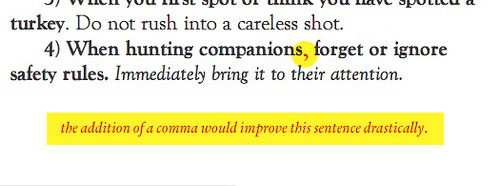
Source: companion season & bag limits, j l t, Flickr
Capitalization
In this section, we will turn our attention to capitalization. When you inspect your writing for problems in capitalization, you will need to keep in mind when to use capital letters. Read the list of capitalization rules below. One item is incorrect. Click on the box of the incorrect capitalization rule when you think you know the answer.

Now, carefully read the paragraph below while keeping in mind the rules of capitalization. As you read, decide whether each word should be capitalized or not, then make your choice from the drop-down menu.


Source: M comma full stop, Sam Kelly, Flickr
Punctuation
Punctuation issues in your writing may include misplaced or missing periods, question marks, exclamation points, commas, semicolons, hyphens, colons, parentheses, and apostrophes. Common problem areas that you may want to look at include the beginnings and endings of sentences (mistakes and missing marks, as in the case of run-ons and fragments), colon and semicolon usage, commas between items in a list, and commas that create run-on sentences. Be sure to look at each instance individually.
Some easy punctuation issues to spot are incorrectly punctuated possessive pronouns (apostrophes) and missing end marks (periods). Look for these issues and others as you read the paragraph below and decide whether each highlighted part is correctly or incorrectly punctuated.


Source: TNS Media Intelligence Pink Highlighter Dude, Tamar Weinberg, Flickr
Spelling
Remember, what you want to do when looking for spelling errors is look for words you don’t recognize (because they may be misspelled), words you often have trouble with, and words that sound the same but are spelled differently (homonyms) such as past and passed.
Many writers find that certain rules help them to remember how to spell particular types of words, especially those formed by adding suffixes (or endings). Here are four spelling rules that may be helpful to you.
- Using i before e
Use i before e, except after c, or when the sound is a long “a” as in neighbor and weigh.
Examples: believe, chief, piece, and thief; deceive, receive, weigh, and freight - Dropping the final e
- Changing a final y to i
- Doubling a final consonant
Common Exceptions: efficient, weird, height, neither, ancient, caffeine, foreign
Drop the final e before a suffix beginning with a vowel (a, e, i, o, u) but not before a suffix beginning with a consonant.
Examples: ride + ing = riding
guide + ance = guidance
hope + ing = hoping
entire + ly = entirely
like + ness = likeness
arrange + ment = arrangement
Common Exceptions: truly, noticeable
Change a final y to i before a suffix, unless the suffix begins with i.
Examples: defy + ance = defiance
party + es = parties
pity + ful = pitiful
try + es = tries
try + ing = trying
copy + ing = copying
occupy + ing = occupying
Common Exceptions:
journeying, memorize
Double a final single consonant before a suffix beginning with a vowel when both of these conditions exist: (1) a single vowel precedes the consonant and (2) the consonant ends an accented syllable or a one-syllable word.
Examples: stop + ing = stopping
admit + ed = admitted
occur + ence = occurrence
stoop + ing = stooping
benefit + ed = benefited
delight + ful = delightful
Read the paragraph again, and this time, look for the suspected spelling errors. Perhaps the word is an example of one of those spelling rules that tends to trip you, such as one of the rules above. As you read, choose the correct spelling from each drop-down menu.

Does this way of editing look like it might work for you? It helps you see mistakes that you might not see if you’re looking at your essay without specific directions. Keep in mind that the process of editing will undoubtedly bring up overlapping areas of grammar. Sometimes a misspelled word involves the inclusion or deletion of an apostrophe at other times maybe a sentence fragment needs a punctuating mark to remedy a grammatical error.
The point to these exercises is to look at written work and think about how each sentence is written. Following a step by step approach gives you a system of editing your work. Now, you will be ready to think through some revisions on your own.